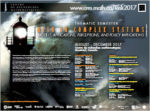Long-Term Programs
Thematic Semester: Risk in complex systems – Models, applications, perceptions, and policy implications, August-December 2017
Organized by Christian Genest, Chair (McGill University)
http://www.crm.umontreal.ca/Risk2017/08/28/17 - 12/13/17
Centre de recherches mathématiques, Centre de recherches mathématiques Université de Montréal Pavillon André-Aisenstadt 2920, Chemin de la tour, 5th floor, Montréal, Canada
 Hazards inherent to complex interconnected systems can lead to disasters of epic proportions with untold environmental, economic and social consequences. The identification, quantification, prediction, control, and mitigation of risk factors is thus essential to ensure individual protection and system integrity while promoting sustainable development.
Hazards inherent to complex interconnected systems can lead to disasters of epic proportions with untold environmental, economic and social consequences. The identification, quantification, prediction, control, and mitigation of risk factors is thus essential to ensure individual protection and system integrity while promoting sustainable development.
This thematic program seeks to promote the study and use of stochastic models and statistical inference techniques that are relevant for an enhanced understanding of the interplay between risk factors and their potentially catastrophic effects on dynamic systems. Dependence models, extreme-value theory and time series analysis form the methodological backbone of quantitative risk management. Many important current issues will be considered, including the development of models for extreme events and large collections of variables, risk aggregation and model validation through expert use, the assessment and control of systemic risk, and risk propagation in epidemiology, finance, power networks, computer systems, etc.
The workshops are designed to foster interactions among probabilists, statisticians, econometricians, regulators, and risk modelers in finance, insurance, hydrology, as well as in the health, climate, and environmental sciences. They will bring together researchers and practitioners from these various areas and will present an excellent opportunity to take stock of recent developments, identify new challenges and initiate fruitful collaborations.
A week-long school based on the bestseller “Quantitative Risk Management: Concepts, Techniques and Tools” by McNeil, Frey and Embrechts (Princeton University Press, 2015) will precede the workshops and provide young investigators and professionals alike with a hands-on introduction to this rapidly growing field.